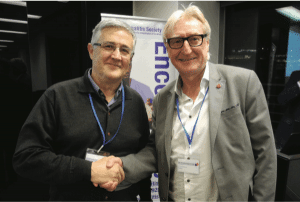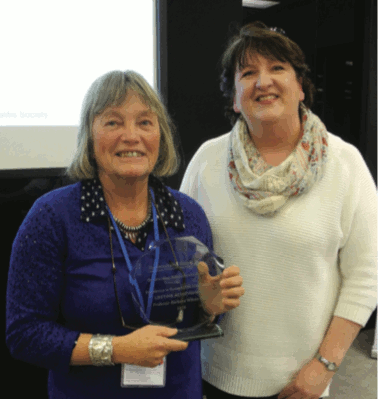
I was among the many attendees of The Encephalitis Society Professional Seminar and I am very pleased to report the tremendous success of the event. The seminar, organised under the theme “New frontiers – Neurology & Patient experiences”, was the perfect platform for national and international experts to share their most recent and exciting research. The event was marked by the attendance of many newcomers (myself included!), from a variety of backgrounds: scientists, healthcare professionals, lawyers and charity members. Undeniably, this was a testimony to the efforts of The Encephalitis Society in promoting a multi-disciplinary network, working together for the common goal of improving the life of patients affected by encephalitis.
The afternoon started with a warm welcome from Dr Ava Easton, CEO of the Encephalitis Society and Professor Tom Solomon, Chair of the Encephalitis Society Professional Advisory Panel and leading expert in the field.
The first keynote address was by Professor Jean Paul Stahl, Head of the Infectious Diseases Department at the University Hospital in Grenoble, France, who presented the work developed by the French Encephalitis group. Professor Stahl shared data from a French national prospective study describing the French experience of encephalitis, and the results of an extensive aetiological investigation, and an assessment of risk factors associated with poorer outcomes. The study not only identified Herpes Simplex Virus and Varicella Zoster Virus as the major causes of encephalitis, but also highlighted the importance of lesser-known culprits, mainly tuberculosis and listeriosis, as causes of encephalitis in France, particularly among those with worse outcomes. In addition, the very high percentage of patients (over 90%) experiencing persistent memory, speech, cognitive or other problems, highlighted the need to optimise treatment strategies. Questions such as the optimal length of acyclovir treatment, the use of adjuvant steroid treatment and the management of sequelae were among those asked and will be pursued in the future by the group.
The next speaker, Dr Rachel Kneen, from the Liverpool Brain Infections Group, presented preliminary ndings from the UK ChiMES (childhood meningitis and encephalitis) study, aiming to improve outcomes of children with encephalitis and meningitis and over 2900 patients recruited to date. Dr Kneen pointed out that management is still sub-optimal among children suffering from a CNS infection, many of whom have long-term consequences, such as behavioural, motor or feeding dif culties. To address these, the study group aims to create a clinical predictor tool to assist in early diagnosis and treatment. Concluding the presentation, we also heard about two ongoing randomised placebo controlled trials, the DexEnceph and the IgNiTE study, assessing the role of dexamethasone in herpes simplex encephalitis in adults and early treatment with human immuno-globulin (IVIG) in children with encephalitis of all causes.
Professor Arun Venkatesan, from the Johns Hopkins Hospital, Baltimore, then presented data on a retrospective study using uorode-oxyglucose-positron emission tomography/computed tomography (FDG-PET/CT) in autoimmune encephalitis. He highlighted the importance of finding a method to aid the early diagnosis of autoimmune encephalitis, given the implications for therapy and the heterogeneity of CSF and MRI findings. A retrospective review of 61 patients with autoimmune encephalitis revealed that most (85%) had abnormalities in their FDG-PET/CT imaging, the majority showing hypometabolism. In addi- tion, this preliminary study pointed specifically to occipital hypometabolism as a potential biomarker for NMDAR encephalitis and even as a marker of severity in this disease.
Next, Dr Catriona McIntosh from the Brain Injury Rehabilitation Trust, Leeds, took us through a very complex and interesting clinical case. Dr McIntosh spoke of the complexities of neuropsychological assessment and rehabilitation in a Colombian patient with a right temporal lobe lesion due to encephalitis, who had a personal history of feral childhood and subsequent physical and emotional abuse. Despite the difficulties of such an exceptional case, it was reassuring to hear that targeted cognitive therapy was beneficial.

After a short break and light refreshments, the second keynote address of the afternoon was delivered by Dr Jim Morrow, a recently retired neurologist and a survivor of VGKC-complex antibody encephalitis. This was an extraordinary personal recount of the events that led to Dr Morrow’s diagnosis, treatment and recovery.
Next, Dr Mark Ellul, from the University of Liverpool, spoke about the emerging mosquito-borne Zika virus infection and its implications for the nervous system. The Zika virus outbreak reached the news due to a recently established association with congenital microcephaly, but Dr Ellul further explored the spectrum of the infection that has been associated with an acute polyradiculoneuropathy, as well as myelitis, encephalitis or meningoencephalitis. Dr Ellul told us about an ongoing collaboration with Brazil that will lead to a full characterisation of the infection and its neurological manifestations and to a prospective case-control study to examine the role of Zika virus in Guillain-Barré syndrome.
Dr Sarosh Irani, from the University of Oxford, focused on antibody-mediated epilepsies. He spoke about a specific form of epilepsy associated with LGI1 antibodies, named faciobrachial dystonic seizures. The clinical description, treatment and outcome of a large cohort was presented. Importantly, we heard how early treatment with steroids or IvIg, but not antiepileptic drugs, appeared to effectively terminate the seizures and appeared to prevent cognitive impairment in the many patients that presented with FBDS prior to the onset of a more global encephalopathy.
Next, Nicola Wainwright, a specialist clinical negligence lawyer with Leigh Day, spoke on the role of lawyers in improving patient experiences. On the background of cases of medical negligence, Ms Wainwright spoke of learning lessons and strategies for preventing future adverse events.
Finally Dr Mildred Iro, from the University of Oxford, presented the results of an observational study on hospital admission trends of childhood encephalitis in England. This register-based, retrospective study analysed the epidemiology, time trends and incidence, of paediatric encephalitis in England over the past 33 years.
Concluding the day, Dr Ava Easton and Professor Solomon gave a joint talk entitled “Lessons from every side: learning from doctor and lay patient narratives”.
Dr Easton reflected on the importance of bridging doctor and patient narratives. Perhaps a reflection of our modern times, medical literature is dominated by either research reports on large cohorts, where individual stories are lost, or clinical cases providing an objective recount of patient’s symptoms and physical findings. Dr Easton reminded us how much health professionals learn from listening to patients’ narratives, as well as how much patients benefit from that improvement in communication. Patients’ concerns often go beyond the disability caused by medical illness; this ”hidden disability” can stem from lack of understanding or recognition of the disease by others, the absence of obvious risk factors and the impact of the disease on family life, among others factors. This introduction to the science of narrative medicine pre-empted the presentation of her book “Life after encephalitis: a narrative approach” which shares unique narratives of encephalitis survivors and their relatives.
Professor Solomon also had published a book “Roald Dahl’s Marvellous Medicine”, which introduces aspects of Dahl’s life unknown to the many fans of the beloved author. Professor Solomon recalled his relationship with the author while working as a junior doctor in Oxford and caring for Dahl during his final weeks of life, and spoke about Dahl’s fascination with medicine, reflecting many unfortunate personal and family events. Not only did Dahl himself suffer a head injury when his fighter plane crashed during World War II, but his son also suffered a severe brain injury leading to hydrocephalus, his daughter died of measles encephalitis and his wife suffered a stroke at a young age. We heard how, driven by these misfortunes and a rare intellect, Roald Dahl invented a valve for the treatment of hydrocephalus, was an active supporter of the implementation of measles immunisation and pioneered many stroke rehabilitation techniques, among many other contributions in several medical areas. Not only is this a fascinating story to read, proceedings from this book will support charities in areas of interest to Dahl, including the hosts of the seminar, The Encephalitis Society.

The Outstanding Achievement Awards for Excellence in Encephalitis Healthcare were awarded at the end of the day. These awards were created to recognise those individuals and organisations within medical health and research establishments, whose contribution made a difference to patients affected by encephalitis. Nominations had been made by healthcare professionals or researchers judged by The Encephalitis Society. The prizes were given in six different categories: Researcher to Assoc. Professor Sarosh Irani, University of Oxford; Rehabilitation Team to Ms Sue Brentall (Occupational Therapist), Mr James Pamment (Clinical Psychologist) and Dr Jessica Fish (Clinical Psychologist), The Oliver Zangwill Centre for Neurological Rehabilitation; Professional Allied Medicine to Ms Alison Gummery (Neuropsychologist), University of Liverpool; and the Lifetime Achievement awarded, very deservedly, to Professor Barbara Wilson, Consultant Clinical Neuropsychologist, The Oliver Zangwill Centre, Cambridgeshire.
The afternoon ended with a Cheese and Wine Reception and a book signing session by Dr Ava Easton and Professor Tom Solomon, thus providing a relaxed and friendly environment for all attendees to meet and share ideas.
